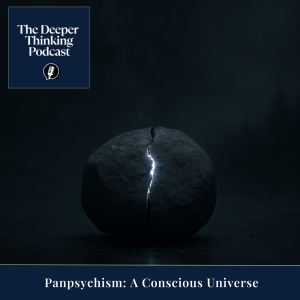
Friday Mar 21, 2025
Panpsychism: A Conscious Universe? - The Deeper Thinking Podcast
Stones do not think. But the thought is not the stone. There is a silence in the material world that does not feel empty. It is the hush of minerals in pressure, of trees in windless forests, of water held still under ice. Something waits there, though it says nothing. It is not aliveness in the usual sense—there is no motion, no pulse, no breath—but it is not absence either. That kind of silence has a weight to it, a presence that is strangely aware. Perhaps not of itself. Perhaps not of anything. But something lingers beneath the visible, a low hum behind the structure of things.
To say the universe is conscious is to say too much too quickly. But to say it is not conscious—at all, in any place, in any part—is to ignore the vertigo that arises when the mind tries to explain itself by way of molecules. Thought reduced to motion, emotion to a tangle of chemicals, the sacred to synaptic discharge. Materialism, in its cleanliness, demands this collapse. And yet something leaks. The hard problem remains. The brain can be mapped, its operations quantified, but the ache of love, the taste of melancholy, the violet shiver of beauty—these do not submit. They appear. They flare. They vanish. The map cannot find them. And still, they move us more than the circuitry.
Panpsychism slips between the binaries. It does not worship spirit over matter, nor dissolve mind into mechanism. It suggests instead a continuity—that consciousness is not added later, but always already there, infinitesimal and dispersed. Not thought, but proto-thought. Not awareness, but its glint. A kind of spark in the grain of everything. Bertrand Russell once suspected that physics describes the external behavior of matter but says nothing of its intrinsic nature. And what if that nature includes the faintest quiver of experience? Not in the sense that rocks dream or rivers remember, but that there is a flicker—blind, raw, irreducible—inside the stone, the current, the quark.
This is not a return to animism. Not exactly. The forest does not whisper because it has a soul, but because we cannot be sure it doesn’t. The difference matters. Animism speaks in myth; panpsychism in inference. But both refuse the vacuum. They resist the picture of a dead world peopled by accidental minds. And the question that follows—if mind is everywhere in pieces, can it assemble into a someone?—tears at the logic of simplicity. The combination problem rears its head. How do many small flickers become a single flame? Can experience, multiplied, congeal into selfhood? Or is it all scattered light, uncollected and cold?
The stone returns, now with a fracture. Earlier, it waited. Now it presses. Not with words, not with intention, but with density. The pressure of its being. It resists interpretation yet demands contact. It is not asking to be understood. It is there. A body without narrative. And still, it insists.
Sometimes, in the moment just before sleep, the mind scatters. Thought becomes mist, not gone, but no longer shaped. It is still there, but it no longer knows how to hold itself. This fog is not unconsciousness. It is a form of it—one where parts no longer combine, only drift. Perhaps this is what the world feels like when it is not watching us. Or when it is watching, but with no eyes.
To believe that matter might feel—barely, quietly, incoherently—is not to romanticize the world. It is to risk its undoing. If everything pulses, then nothing is inert. If nothing is inert, then every encounter is charged. Ethics tilts. Ecology warps. The deadness of things evaporates. And one is left with a trembling in the fabric of the real, where each thread might twitch.
Stones do not think. But something in them might listen.
***
If you'd like to support the project directly, go tobuymeacoffee.com/thedeeperthinkingpodcast
Comments (0)
To leave or reply to comments, please download free Podbean or
No Comments
To leave or reply to comments,
please download free Podbean App.